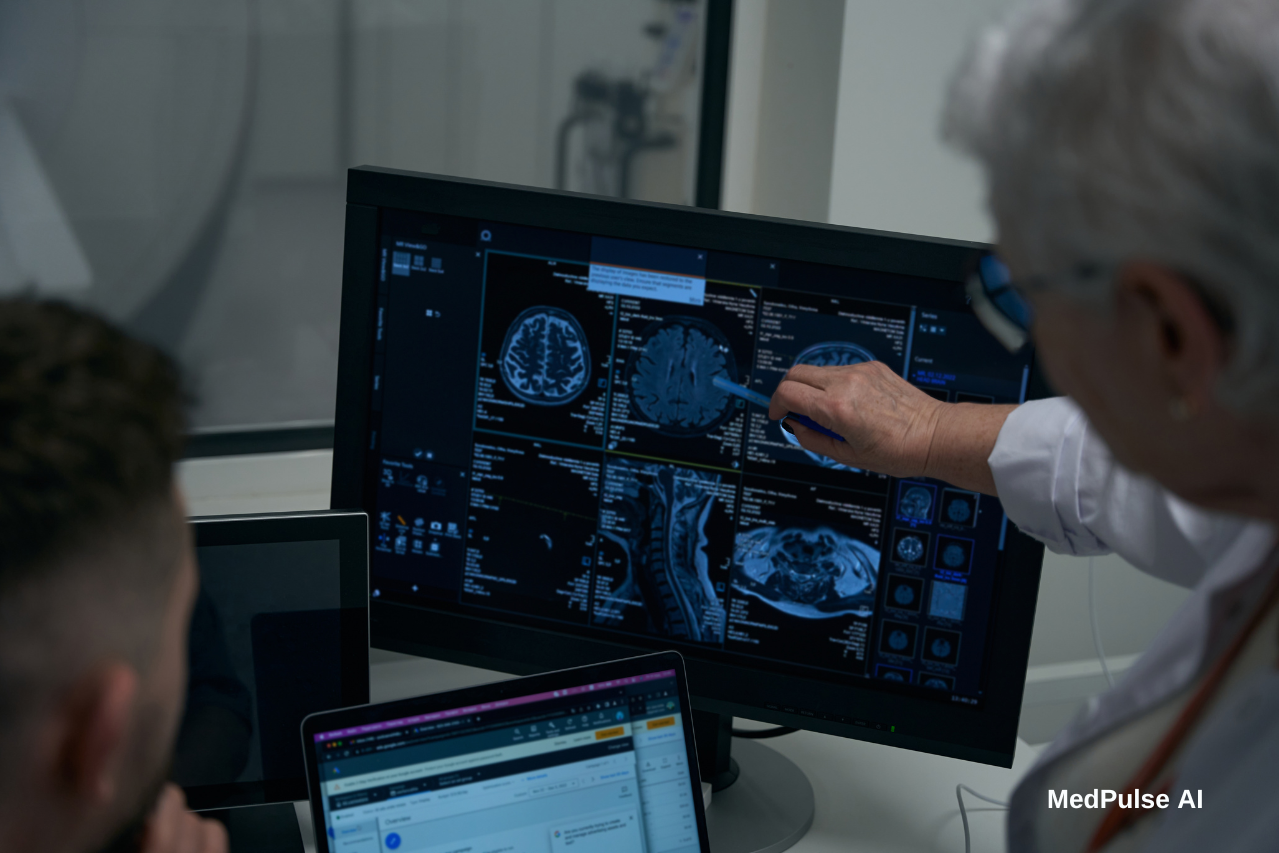The convergence of artificial intelligence (AI) with other emerging technologies is reshaping healthcare and how we approach aging. For older adults, the benefits of AI-driven solutions are particularly significant, providing tools to enhance independence, reduce isolation, and ensure better health outcomes. In an era where populations are aging at unprecedented rates, these innovations—ranging from information and communication technologies (ICT) to AI, virtual reality (VR), augmented reality (AR), and telehealth—are not only supporting older adults’ independence but also enhancing their cognitive, health, and psychosocial well-being. But what does this mean for the future of aging, and how is AI truly making a difference?
The Growing Need for AI in Aging Populations
According to the United Nations, by 2050, 1 in 6 people worldwide will be over the age of 65, compared to 1 in 11 in 2019. This demographic shift places immense pressure on healthcare systems, caregivers, and older adults themselves. The ability to live independently is a key concern for many older adults and their families, as maintaining independence often correlates with a higher quality of life and well-being.
AI-driven technologies have stepped up to meet these challenges, offering solutions that support autonomy, while also addressing the needs of caregivers and healthcare professionals.
The Cognitive and Health Benefits of AI and Emerging Technologies
As adults age, cognitive health and physical independence become critical factors in maintaining a high quality of life. Artificial intelligence and related technologies are playing a growing role in addressing these challenges by helping older adults enhance their cognitive functioning, monitor their health, and interact with the world around them in new, empowering ways.
AI-Powered Cognitive Support
AI-driven tools and platforms have been integrated into cognitive training programs designed to slow cognitive decline and enhance mental sharpness. For example, cognitive games powered by AI algorithms adapt to individual users’ cognitive abilities, personalizing the difficulty levels and types of tasks to encourage ongoing mental engagement. These games help build and maintain neural connections, which are essential for memory retention and mental flexibility.
New research published in the Journal of Aging & Health (2023) highlights how AI-enhanced cognitive games can improve cognitive reserve—the brain’s ability to improvise and find alternative ways of getting tasks done—particularly in older adults at risk of Alzheimer’s and dementia. The findings suggest that AI-driven cognitive training may slow the progression of cognitive impairments by as much as 30%.

Virtual Assistants: AI for Everyday Independence
Virtual assistants like Amazon’s Alexa, Google Assistant, and other AI-powered voice interfaces are transforming the lives of older adults by helping them with daily tasks, reducing isolation, and even providing companionship. These tools allow users to set reminders for medication, control smart home devices, or even call for help in emergencies—all through voice commands.
A recent study published in the Journal of Medical Internet Research (2023) found that 60% of older adults who used AI-powered virtual assistants for at least three months reported improved feelings of independence and a reduced need for external caregiving support.
However, it’s not just about convenience—virtual assistants are also being integrated into healthcare systems to perform health checks or remind patients about their upcoming appointments or medication schedules, providing an extra layer of health management.
Real-World Example:
In partnership with the National Health Service (NHS) in the UK, Amazon’s Alexa has been programmed to provide health advice directly from NHS health guidelines. This type of AI integration could be a game changer for older adults living alone, offering quick, accessible health advice without the need to visit a doctor’s office.
The Role of Virtual and Augmented Reality (VR/AR) in Aging
Recent advancements in virtual reality (VR) and augmented reality (AR) are opening up new possibilities for enhancing cognitive and psychosocial outcomes in aging populations. Research shows that these immersive technologies can stimulate cognitive function, promote social interaction, and even reduce the risk of loneliness and depression—two psychosocial challenges that many older adults face.
For instance, VR applications are being used to create virtual environments that allow older adults to engage in virtual social interactions, reminisce about past experiences, and participate in simulated activities like travel or visiting familiar places. These experiences can help stimulate cognitive function by evoking emotional memories and encouraging active problem-solving, which can contribute to healthier aging.
AR-based assistive technologies are enabling older adults to navigate their physical environments more easily. By overlaying digital information in the real world, AR tools can provide reminders for daily activities, directions in unfamiliar places, or guidance for safe mobility.
In a study conducted by the International Journal of Geriatric Psychiatry (2022), older adults using VR for social engagement reported a 40% reduction in feelings of isolation after just three months of regular use. These findings suggest that VR and AR technologies hold significant potential in addressing the mental health needs of aging populations.

Information and Communication Technologies (ICT) and Psychosocial Outcomes
Information and communication technologies (ICT), such as smartphones, tablets, and video conferencing tools, are increasingly being used to enhance psychosocial outcomes in older adults. These technologies have made it easier for older adults to stay connected with friends, family, and social support networks, reducing feelings of loneliness and isolation.
With the integration of AI, these platforms can now be customized for aging populations, offering features that cater to their unique needs, such as simplified interfaces, voice commands, and reminders. Mobile applications designed for older adults focus on providing easy access to health services, cognitive training, and social interaction platforms.
One notable advancement is the rise of companion apps that use AI to simulate conversations, provide reminders, and monitor emotional well-being. These virtual companions have shown the potential to offer emotional support and reduce loneliness, especially for older adults living alone.
In a 2023 study by the American Psychological Association, older adults using ICT platforms with AI enhancements showed a 35% improvement in emotional well-being after six months, highlighting the positive role of communication technologies in fostering mental health.
Assistive Technologies: AI to Enhance Independence
Assistive technologies equipped with AI are transforming the daily lives of older adults. These devices range from smart canes and hearing aids to AI-powered mobility aids that assist with walking, stair navigation, and fall prevention.
For example, AI-enhanced mobility tools can analyze a person’s gait and balance, predicting falls before they happen and alerting caregivers or healthcare providers. This allows for proactive interventions, reducing hospitalizations and giving older adults more confidence in their ability to move around safely.
Wearables, such as AI-enhanced prosthetics, are also enabling older adults with disabilities to regain mobility and independence. These prosthetics adapt to a user’s specific needs, learning how they move and making adjustments for better functionality and comfort.
Theoretical Advancements in Aging and Technology
The rise of AI and digital technologies is also contributing to theoretical advancements in the psychology of aging and adult development. By building upon psychological theories, researchers are developing a deeper understanding of how technology influences cognitive, emotional, and social processes in older adults.
For example, the Socioemotional Selectivity Theory (SST) suggests that as people age, they become more selective about how they spend their time, focusing on emotionally meaningful experiences. AI-driven technologies that promote social connection or cognitive engagement align with this theory, offering older adults the opportunity to optimize their time and interactions in ways that enhance their well-being.
Furthermore, the Continuity Theory—which suggests that individuals strive to maintain consistency in their lives as they age—can be applied to AI and telehealth platforms, as these tools allow older adults to continue living independently while maintaining regular health checkups and connections with their social circles.
AI-Powered Health Monitoring
Health monitoring is one of the most promising areas for AI’s impact on older adults. AI-powered wearables, such as smartwatches, biosensors, and telehealth platforms, allow for continuous health monitoring, providing real-time data on heart rate, oxygen levels, movement, and more. These devices can alert healthcare providers or family members if they detect any concerning changes in a person’s condition, such as falls, irregular heartbeats, or unusual behavior patterns.
Statistics from Gartner (2023) predict that the use of wearable health devices among adults aged 60 and above will increase by 40% over the next five years, driven by their increasing integration with AI algorithms capable of early detection of health issues.
For example, companies like Apple and Fitbit have integrated AI algorithms into their health tracking apps, which can detect abnormalities such as atrial fibrillation (AFib), often a precursor to more serious cardiovascular issues. This allows older adults to take preemptive actions, avoiding potentially life-threatening situations.
The KardiaMobile device by AliveCor, an FDA-cleared AI-powered ECG monitor, can be used by older adults to detect AFib and other heart conditions, sending real-time reports to their healthcare providers. This level of real-time monitoring, paired with AI analysis, can drastically reduce hospital visits while giving older adults peace of mind.
Personalized Care with AI
AI isn’t just about automating daily tasks or health monitoring; it also enables personalized care that adapts to the specific needs of older adults. With AI-driven data analytics, healthcare providers can create personalized care plans, tailoring treatments and recommendations to an individual’s medical history, genetics, and real-time health data.
A 2022 study by McKinsey found that AI-powered personalization in healthcare can improve patient outcomes by up to 25%, particularly among older adults who often have complex medical needs requiring continuous, adaptable care.
AI systems like CarePredict use sensors placed around the home to track the daily habits of older adults. The AI analyzes patterns to predict potential health risks, such as detecting early signs of cognitive decline or mobility issues. This allows caregivers and healthcare providers to intervene before these risks turn into serious problems, effectively providing proactive, personalized care.
Challenges and Ethical Considerations
While AI offers tremendous promise for enhancing the independence of older adults, it also presents challenges. Privacy concerns and the digital divide—the gap between those who have easy access to technology and those who do not—remain significant barriers. Older adults, particularly those in low-income households, may lack the skills or resources to use AI-powered devices effectively.
Additionally, the reliance on data for personalized care raises questions about data security. Are the sensitive health data collected by AI systems being adequately protected? This is an ongoing concern that tech companies and healthcare providers must address as AI becomes more integrated into care models for aging populations.
Future Outlook: AI and Aging Populations
The role of AI in supporting older adults will only grow in the coming years. Advances in robotics may soon bring about AI-powered companions capable of not just assisting with physical tasks but also providing emotional support and social interaction. AI-enhanced smart homes could offer environments where older adults can live independently for longer, with everything from the lighting to temperature control being optimized for their comfort and safety.
Moreover, AI-driven innovations such as predictive analytics and telemedicine are likely to redefine healthcare for aging populations. With real-time data and personalized AI-driven care plans, older adults can maintain a high quality of life well into their later years, ensuring that independence is a possibility, not just a goal.
AI is playing an indispensable role in empowering older adults to maintain their independence, whether through virtual assistants, AI-powered health monitoring, or personalized care plans. The statistics and case studies highlighted in this post show how AI is not only improving lives but also easing the burden on caregivers and healthcare systems.
As we continue to see AI evolve, it is essential to address the challenges and ensure that these innovations remain accessible to all. By focusing on ethical implementation, closing the digital divide, and enhancing privacy protections, AI-driven solutions can offer older adults a brighter, more independent future.




